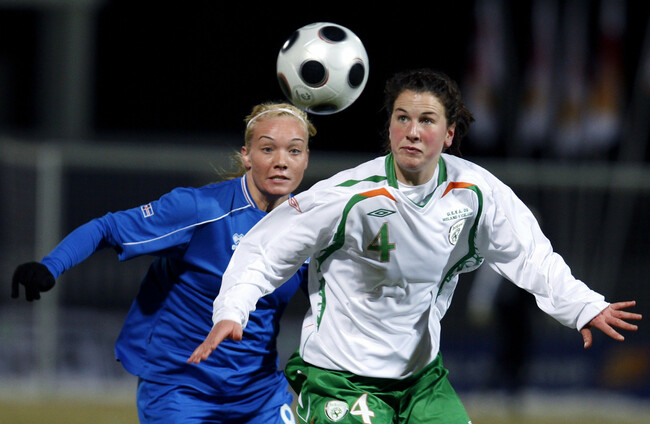ONE HEADLINE SAID it all: Irish dreams of Euro finals frozen out.
The closest the Republic of Ireland women’s national team have ever come to reaching a major tournament at senior level was the 2009 European Championships.
Vera Pauw’s side are within touching distance of play-offs as they face into a decisive World Cup qualification double-header against Finland and Slovakia over the next 10 days or so, a win against the Finns at Tallaght Stadium on Thursday would guarantee their progression.
2008 was the only time Ireland ever before contested a play-off for a big time international tournament.
Noel King the then-manager and Iceland, another Scandinavian opponent, the challengers. Three members of the current squad — Niamh Fahey, Áine O’Gorman and Louise Quinn — were involved, along with the likes of Stephanie Roche, Emma Byrne and Olivia O’Toole.
Ireland qualified for the Euro 2009 play-offs after finishing third in their group behind Italy and favourites Sweden — the runaway winners of Ireland’s World Cup qualifying pool 14 years later — with four wins recorded against Hungary and Romania.
When the draw was made, Katie Taylor was the face of RTÉ’s article, but the legendary Irish sporting figure was absent from the final play-off squad. Boxing soon consumed her sporting focus, a glittering career in the ring has since unfolded.
Iceland were 18th in the Fifa world rankings at the time, with Ireland 28th. (Pauw’s side are now 26th, their highest-ever ranking achieved this summer.)
Richmond Park hosted the first leg, which was billed “the biggest occasion for women’s football in the association’s history” by The Irish Examiner.
“I would appeal to everyone in the football family to come along and support us,” King said beforehand, urging an increase on the previous attendance of 1800 at the Carlisle Grounds. (Adult tickets were €10, the same as Thursday’s, with U16s free, compared to €5 now.)
“This is obviously a massive occasion for the women’s game but also for Irish football as a whole. There has not been a more important play-off match for this country since Mick McCarthy led Ireland to the World Cup 2002 play-off against Iran to put us through to the finals in Japan/South Korea.”
On potentially qualifying for the finals, the now-Shelbourne boss added: “It would be a significant achievement for Ireland and a highlight in the players’ careers as we would be up against the best players, all full-time professionals, and all of the matches will be screened live on TV for one of the biggest sporting events in Europe in 2009.”
Just 25 seconds in at Inchicore, those hopes appeared to go up in smoke. Holmfridur Magnusdottir smashed home from eight yards, after Dóra María Lárusdóttir caught Ireland on the hop down the right and delivered a brilliant low cross.
Ireland settled, slowly but surely, creating some chances of their own, but were let off as the visitors threatened time and time again. Stephanie Curtis proved the Girls In Green’s goal-scoring hero when her 63rd minute strike– with great work from substitute O’Toole in the build-up — salvaged a 1-1 draw.
The qualification dream remained alive, and four days later, Reykjavik’s Laugardalsvöllur Stadium staged the return leg. It’s remembered for all the wrong reasons, with no shortage of controversy involved in the 3-0 defeat.
Minus temperatures in the Icelandic capital cast doubt over the fixture early in the week, but improved weather saw the pitch thaw out on the Wednesday, before it passed a final pre-match pitch inspection.
All of the newspapers described “difficult, icy conditions” in their match reports, the Sportsfile photographs showing a frozen pitch with heaps of snow on the side as two goals from Lárusdóttir and another from Vidarsdóttir sent Iceland through.
It’s one that pains the Irish involved to this day; Niamh Fahey’s mind immediately returning to Reykjavik when asked for any standout moments in the lead-up to her 100th cap in February.
“That’s always a hard one,” she told reporters. “I remember them for the wrong reasons. The Euro 2009 play-off against Iceland, it was 1-1 in the first leg at home and lost 3-0 away.
“The second leg shouldn’t have gone ahead because the pitch was frozen. They had some special footwear on but we couldn’t get to grips. It was like ice-skating and one of our players came off and went to hospital thinking she’d broken both her wrists from falling on the pitch. It only went ahead because there was cameras there and Uefa said it had to. Noel King was going crazy, wanting the game called off after two minutes. That was closest we’ve gotten to date.”
O’Gorman, who was 19 at the time, remained at a similar loss to how the fixture went ahead in an interview with The Irish Mirror last October.
“I will never forget the game, it was crazy, the pitch was like ice. The Icelanders must have been wearing ice-skates, they were all flying and we were all sliding around — I think one of the girls fell and nearly broke both of her arms.
“I remember the fourth official banging the shovel before the game and it wasn’t breaking. And it was live on Eurosport, it was crazy. I don’t think it would happen in this day and age.
“In hindsight, you probably say that we shouldn’t have played. But we were in that moment, you had prepared, you had travelled to Iceland and qualifying for a tournament was only one game away, and that is the closest we ever got.”
Iceland went on to finish bottom of their group at the finals, which were ironically held in Finland. They endured three defeats from three, conceding five goals and scoring just one. They had the dream start, scoring against France in the sixth minute of their opener, but that was as good as it got for Ireland’s conquerors.
The toppers of their group, Germany, went on to win the tournament, beating England 6-2 in the final. The Lionesses — Euro 2022 champions after the same final pairing — saw off the Netherlands, managed by a certain Vera Pauw, to get to the decider. They also edged out Finland, who hailed from the same group as the Dutch, in the quarter-final.
The showpiece was held at Olympic Stadium Helsinki — the same venue at which Ireland secured a monumental 2-1 win over the Finns last October to kickstart their World Cup qualification bid.
Now that bid reaches its most crucial juncture.
A decisive double-header ahead as Ireland look to reach the heights of 2008 once more.








